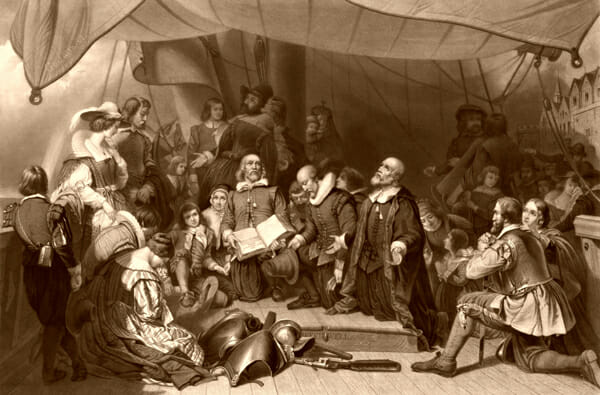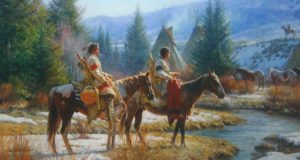Each and every year, we celebrate a story of survival. But few people, other than schoolchildren, bother to think about it.
The story of Thanksgiving is one of survival. The Pilgrims who landed at Plymouth Rock in 1620 established one of the first permanent settlements in the New World. Yet, they almost didn’t make it.
The biggest problem the Pilgrims had was a severe lack of preparedness. They arrived far into the Northeast, from a grueling sea journey, in November, with winter just around the corner. Originally, they were to travel in two ships, with the Mayflower being their cargo ship. But when the Speedwell was found to be unseaworthy, they had to quickly retrofit the Mayflower for passengers and leave a lot of their cargo behind.
Due to a late start and a longer voyage than expected, the Pilgrims landed in the New World much later in the year than expected. They also made landfall much farther north, which make the encroaching winter a much more serious issue. There was little time to build shelters and prepare for winter before it was on them.
Put God Back Into History And Teach Your Kids What They Won’t Learn Anywhere Else!
Fortunately for them, the Mayflower stayed through the winter, providing them with shelter and food. Even so, about half of their population died off that first winter, through a combination of disease and starvation. It wasn’t until the next year that they established a firm footing on modern U.S. soil, doing what was necessary to ensure their survival.
The Pilgrims who made that journey were not well-suited for wilderness survival. They were city folk who were used to living in established society. While many knew useful skills, they did not know the skills needed for establishing a colony in a new land. Those they were going to have to learn.
So, with all that was stacked against them, how did the Pilgrims manage to survive?
In truth, the things the Pilgrims did to survive don’t look like “survival skills” to us today. That’s because many of the things we call survival skills were things that they took for granted as part of their day-to-day life. Starting a fire wasn’t a specific survival skill, but rather something learned by 10-year-old boys, when they would take over responsibility for keeping the fires going in their homes.
Much of the “skill” that allowed them to survive was more about their attitude, rather than anything we would recognize as a skill. They developed the right mental attitude, then everything else followed. This really is not much different than a modern prepper, except in the fact that they were forced into it by the necessity of their situation.
Nevertheless, there are several key elements to their survival that it would do us good to emulate. That is, unless we want to learn everything the hard way, too.
Learned From the Experts
Much has been said about the Native-American, Squanto, who became their teacher and interpreter. Squanto had recently escaped from captivity in England. Returning to his native land with an explorer, he soon discovered that his tribe had been decimated by plague.
When the Pilgrims landed at Plymouth Rock and began to establish their settlement, Squanto became their friend. Having grown up an American Indian, he knew the forests and the animals that inhabited them. He had extensive knowledge of the ways of the Indians and what they did to survive. This he passed on to the Pilgrims, teaching them the knowledge of his people and giving them the skills they needed to survive.
Squanto was also the Pilgrims ambassador, arranging meetings and alliances with friendly Indian tribes. This strengthened the Pilgrim colony, as well as opening doors for trade, by which they could receive the bounty which the Indians harvested from nature.
Used What They Had Available
While the Pilgrims didn’t come to the New World properly outfitted for survival, they did come with tools, goods and other supplies. These were put to use in helping them to survive and establishing their colony. Their inventiveness in using what they had was demonstrated by the use of a printing press to undergird a beam in the Mayflower, when rough seas caused it to crack.
They also made good use of the Mayflower itself, living aboard as they prepared shelters on shore. Some lived through the winter in the ship, as there were not enough homes available for every family.
The homes themselves were built from whatever was on hand. Fortunately for the Pilgrims, they had landed in an area with abundant forests. So they were able to use the trees they felled in clearing land to farm, in order to build their homes and barns.
Each Man for Himself
Although we typically learn that the Pilgrims struggled through that first winter, with many dying, we don’t learn that they struggled through the next two, as well. In fact, it wasn’t until 1624 that they had an abundant harvest and were able to make it through the winter comfortably.
What made that difference? When the colony was established, it was done so under contract with the Virginia Company of London and the Virginia Company of Plymouth, both “adventurer” companies. As part of their contract, they were to work as a commune. Each would work according to their ability and each would receive according to their need.
While that sounds like a wonderful system, it isn’t. As with all socialist systems, it eliminates reward. Many received more than they worked for and many others earned much more than they received. That bred discontent, which manifested itself in laziness and a general unwillingness to work. Those who worked, didn’t give it their best effort.
This led to two more difficult winters, until the governor, William Bradford, eliminated the socialist system, giving each family a plot of ground and allowing them to keep the fruit of their labor. This was not done in all things, but first done only in the growing of corn.
The result was that triple the amount of corn was planted, as what had been planted the years before. When the crop was threatened by drought, the governor declared a fast, and God answered, giving them rain. Their crop that year was so abundant that they were able to export an entire ship full of corn that same year.
Trusted in God
Finally, the Pilgrims depended on a deep, abiding trust in God. Some may not see that as a survival skill, but history has proven over and over again, not just in Plymouth, but in other places, that God is in control. When we trust in Him, our chances of survival are greatly increased.
Faith is as necessary to human existence as oxygen is. While some might claim that they can survive without faith, what they are really saying is that their faith is in something other than God. They might be trusting in science or knowledge of even their own strength. But they are trusting in something. How much better to follow the example of the Pilgrims and trust in God.
What do you think? Share your thoughts in the section below:
 Off The Grid News Better Ideas For Off The Grid Living
Off The Grid News Better Ideas For Off The Grid Living




